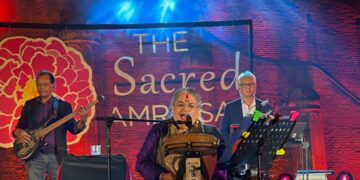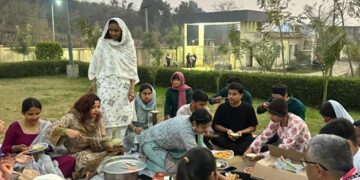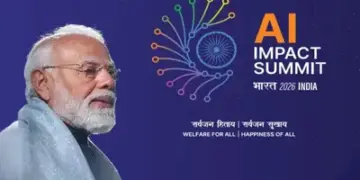
Born on July 22, 1934, in Zaindar Mohalla, Srinagar, Professor Hari Krishan Kaul, holds a significant place in the literary world of Kashmir. In 1960, he completed his M.A. in Hindi from the University of Kashmir and went on to become a lecturer in Hindi in the State Higher Education Department.
During the period of 1950 to 1967, Kaul dedicated himself to writing stories in Hindi. His inaugural Hindi story, titled “Us Patthar Ki Kahani,” was published in the weekly magazine “Saptahik Hindustan” in 1959. In 1967, he ventured into Kashmiri literature, perhaps driven by his profound love for his mother tongue. His first Kashmiri story, titled “Shiraza,” was published under the title “Taf” in the August 1967 edition. Kaul since then penned around two dozen stories in Kashmiri, which have been published in esteemed newspapers and magazines such as “Son-Adab,” “Chaman,” “Neb,” “Koshur-Adab,” and “Shiraaza.”
As already mentioned, in addition to his writing pursuits, Kaul served as a Hindi lecturer in the College Education Department of Jammu and Kashmir for many years. Furthermore, he assumed the role of coordinator of the Language Advisory Committee of the BharatiyaJnanpith Award Board for several years, of which I,too, had the privilege of being a member. Through his stories, Kaul endeavours to expose the superficiality of modern society, particularly the false prestige of the middle-class society.
One of Kaul’s most celebrated stories “Poshkuj” titled “Taaf” in Kashmiri, stands out as a master-piece in the history of Kashmiri story-telling.I have had the pleasure of translating this exquisite tale into Hindi for my collection, “Kashmiri ki Shresth Kahaniyan.” By portraying the traditions and devotion of a conventional mother-in-law, the story simultaneously unveils the fragile facade of middle-class society through the affected and ostentatious behavior of the son-in-law and the modern daughter-in-law.
Kaul was not only a renowned poet but also a highly accomplished playwright, leaving a lasting impact on the world of theater. Among his notable works are “When Paths Become a Maze” (Yelivatankhur chu yvan), “Turban” (Dastar), “Curfew,” “One Who Takes Poison” (Yusuyzaharkheyi), “Milk Is Your Medicine” (Dwadchhuydawa), “Ploy” (Tshal), “Friends and Foes” (Paninytiparidy), “Arithmetic” (Hisabkyitab), and “Craving” (Amaar).
One of his remarkable plays, “Stop the Drama” (Natukkeriv band), premiered in 1977 at Tagore Hall in Srinagar under the direction of the Rangmanch Dramatic Club. Kaul skillfully employed the traditional Dharmik dramatic form and the play-within-the-play technique to achieve a seamless integration of his ideas with a meticulously structured sequence of events. This slashing satire delves into the realm of contemporary politics. Kaul’s plays often revolve around ordinary individuals, offering an opportunity for introspection on both mundane and profound aspects of life and existence. The characters he creates are authentic and relevant, eliciting a strong connection with the audience.
In the humorous play “Turban” (Dastar), Kaul introduced an unforgettable character, an old accountant whose outdated approach to office work became legendary. His famous catchphrase, “Rama LagayChaanyaLilaye,” continued to resonate through the streets of Srinagar long after the play first aired on television.
During the mid-1970s, Kaul’s play “Stop the Drama” (NaaTuk Kariv Band) made its debut at Srinagar’s Tagore Hall. Drawing inspiration from the epic Ramayana, the play presents Hanumana’s rebellion against Rama’s decision to exile Sita. As the plot unfolds, Rama symbolizes the ruling politicians who betray the people, represented by Sita, solely to maintain their grip on power. Hanumana exposes this treachery, crying out for an end to the drama (“NaaTuk Kariv Band”). This play stands as a significant milestone in Kashmiri literature and has been staged not only in Hindi but also in other Indian languages. It is said that Sheikh Mohammad Abdullah, the then Chief Minister of the state, witnessed a performance of this play in Delhi and was deeply moved by its impact.
Here I recall, a few years ago the Hindi translation of Kaul’s short stories collected in his story-collection: ‘YathRaazdaanyaManz’ translated by Gauri Shankar Raina was published by Sahitya Akademi, Delhi. I had the proud privilege of acting as a reviewer of the translation-work on behalf of the Akademi.
Kaul has received numerous national awards for his writings, including the prestigious Sahitya Academy Award. Sadly, he passed away on January 15th, 2009, leaving behind a rich legacy in the world of literature and theater.
The writer is former Fellow,IIAS,Rashtrapati Nivas,Shimla, Ex-Member,Hindi Salahkar Samiti,Ministry of Law & Justice, Senior Fellow, Ministry of Culture, GOI.







